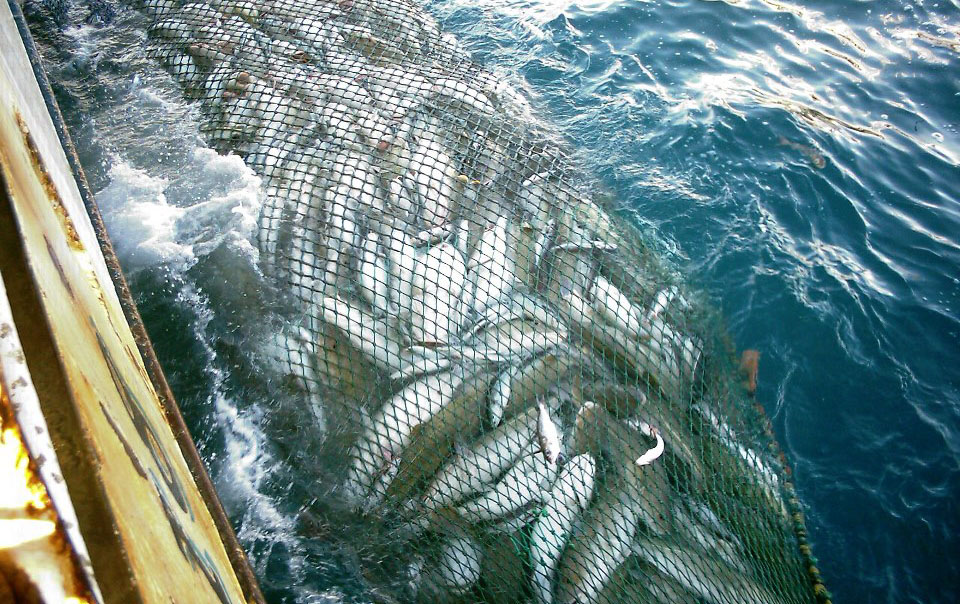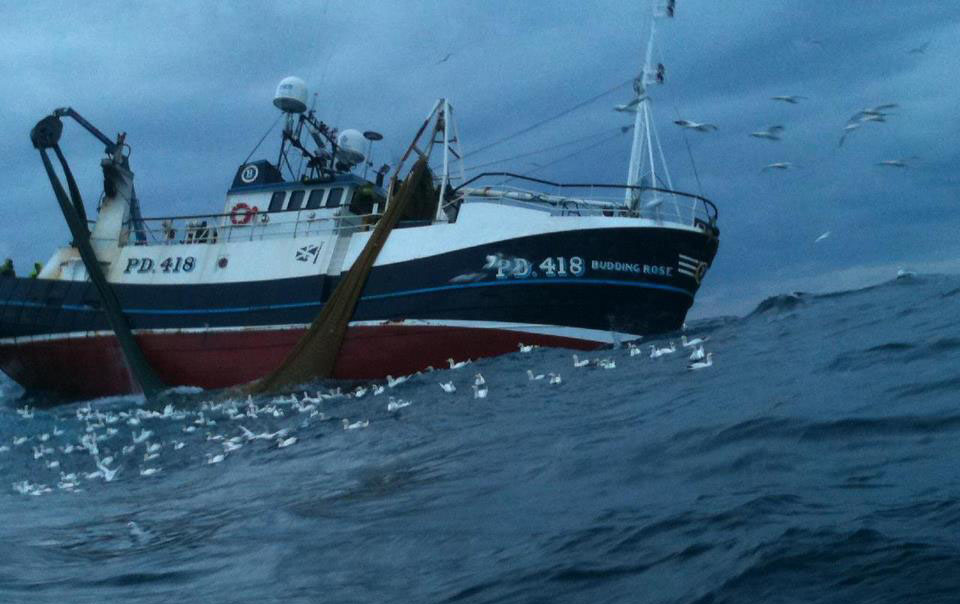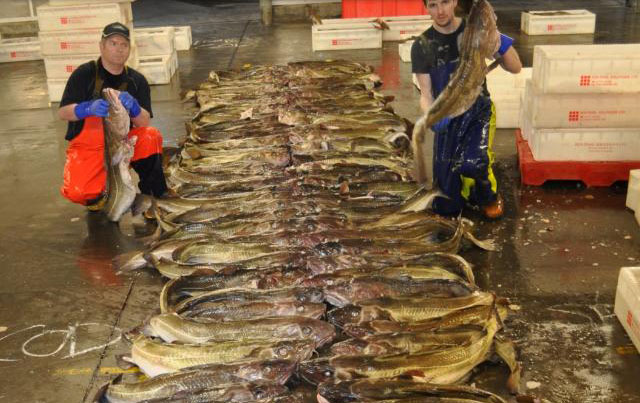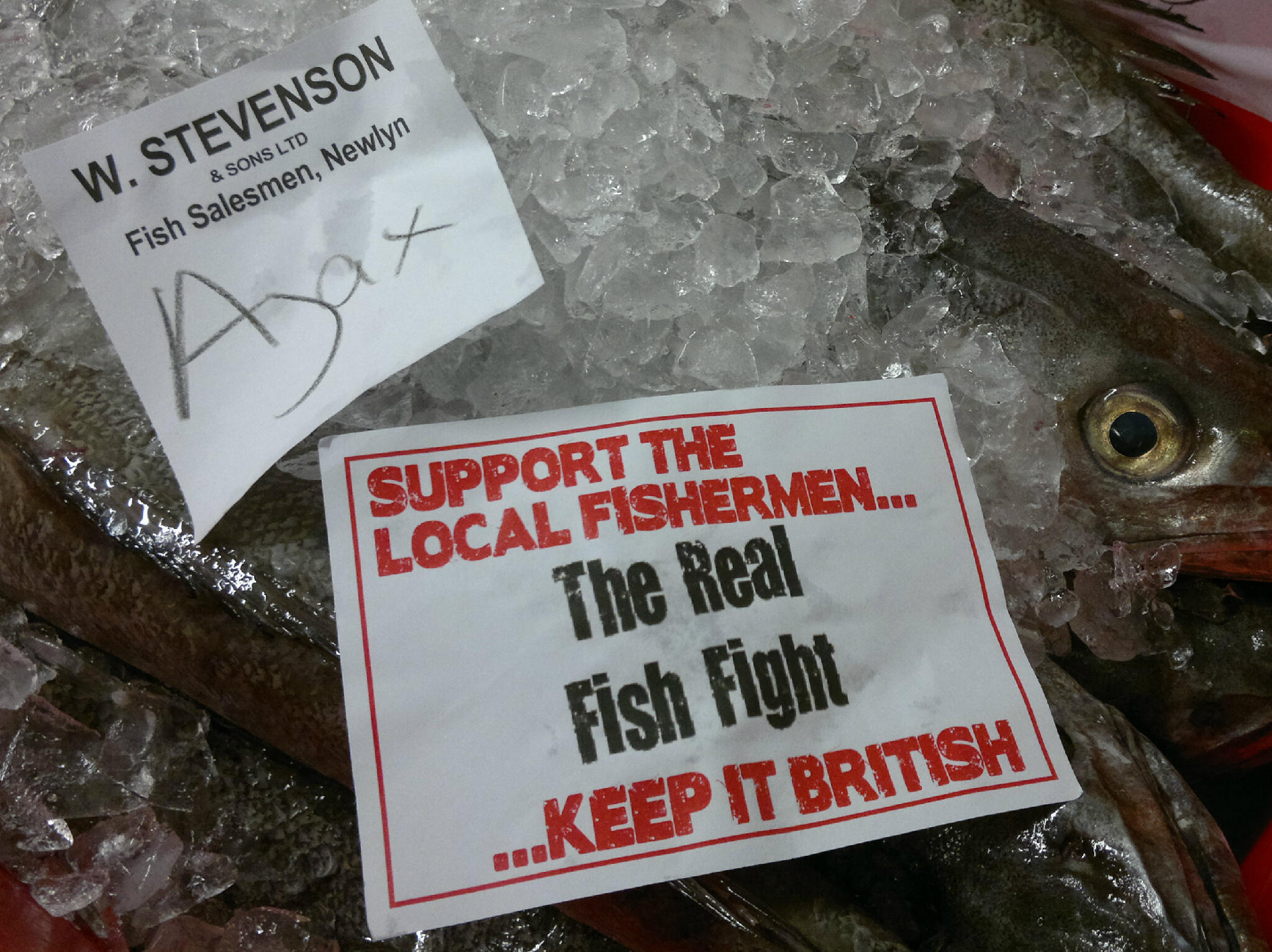Welcome to Through the Gaps, the UK fishing industry's most comprehensive information and image resource. Newlyn is England's largest fish market and where over 50 species are regularly landed from handline, trawl, net, ring net and pot vessels including #MSC Certified #Hake, #Cornish Sardine, handlined bass, pollack and mackerel. Art work, graphics and digital fishing industry images available from stock or on commission.
Friday 22 March 2013
Fish Fight shirts! - Order yours today!!
The landlord in the Seven Stars in Penzance (still referred to by many as The Smithy) has had these made.
EU fishermen ‘need flexibility, not micro-management’
Catch quota management and the ban on discards will be passed as part of the EU’s common fishery policy reform, but for it to work, fishermen need to be given the control and flexibility to implement it.
This is the view Mogens Schou, Danish ministers’ adviser for fisheries and aquaculture and chair of the EU Commission’s standing committee on agricultural research for fish, gave Undercurrent News shortly after his presentation at the North Atlantic Seafood Forum.
Schou is also a partner in Aquamind, a firm which advises on designs and implementation sustainable fishing practices in line with EU law. As part of this job Schou has worked with Danish fishermen to employ the catch quota management (CQM) system since 2008.
CQM is effectively the counting of all catches against quotas, which is in direct contrast to the current system in which the discarding of over-quota fish is standard. CQM should lead to selective fishing, as well as much better data on the stocks of fish. “The CQM scheme in Denmark has been used with full compliance and accountability for 140,000 fishing hours,” he said.
“Aquamind’s done some experiments with a few vessels fishing with a free choice of gear, and you can see, compared to selective gear provided by regulators, you can improve selectivity and improve fuel efficiency.”
Put simply, his belief is that when CQM is in place, it is in the fishermen’s interests financially to catch only what they should be – adult fish of the species they hold a quota for.
The most effective way to do that is to allow the fishermen the flexibility to choose gear, and fishing days, with which they can land the highest-value catch, as opposed to being micro-managed by strict regulations.
“My concern is that you do not remove micro-management once you introduce the CQM and the discard ban,” he said. “Failing to do so will entail a loss in wealth for society, and for the fisher who has to optimize within numerous rules instead of against the quota outtake alone.”
“There is no incentive among the legislators to remove this micro-management. The only chance I think to have it removed, is if the industry takes care of its own interests and demonstrates how it can be done.”
“It takes two hours to change fishing gear, but if you guys had to do it we would have to wait two years for Parliament and Council to act, and the situation would be quite different”
With that in mind, Schou is advocating large-scale trials of CQM in EU member states, where it can be judged by the relevant measures – value per catch unit, catch composition – and without the strict controls and regulations.
“Once the industry has demonstrated that this works it will be easier for the legislative powers to translate those terms of the trial into concrete EU legislation,” he said.
It is his hope that this trial can begin in early 2014, and align with the date of the discard ban entering into force in the pelagic fishery and in Skagerrak. Other areas will follow suit.
If the trial extends into the Baltic and the North Sea then the participating nations will have, in effect, established the discard ban prior to the date fixed by the EU, and without the micro-management, he said.
Aquamind and the Danish Technical University (DTU Aqua) are preparing for the large scale trial to begin Jan. 1 2014, and are waiting to find out if the European Fisheries Fund will be financing it, with a decision expected in August.
The best example of efficiency through flexibility is that of a fisherman Schou met during the CQM trial in Denmark.
A fisherman participating in the trial was altering his gear prior to a fishing trip, fixing a different mesh panel to it.
“The area I will fish in for the next two months has a lot of small cod,” he told Schou.
“Having to count all catches I will use the panel for that period to avoid the juveniles. It takes me two hours to change gear, but if you guys had to do it we would have to wait two years for parliament and council to act, and the situation would be quite different.”
“This is about optimizing the economy, optimizing the food output, and to do that it is necessary to be flexible and to adapt to circumstances, and you can not do that in the legislative system,” explained Schou.
Another part of Schou’s work with Aquamind is advising fishermen on what they can do with fish landed instead of discarded. There are some very interesting solutions for by-catch, he said.
“One would be converting the fish to silage aboard the vessel. By doing that it is easier to store more volume, and quicker,” he said. “We are working with DNA solutions to identify catch composition in silage.”
“There are some interesting markets for this silage product, and that way you can even use the offal. This counts for 15% of the material when cut at sea, so 15% of total catch can be added to valuable materials if it’s processed at sea.”
Schou is hoping that the EU Commission, Council and Parliament can be convinced by
successful trials to hand control over to the fishermen.
successful trials to hand control over to the fishermen.
“I’m optimistic, and the fishermen see this as the way forward. It’s an opportunity they should take advantage of.”
Hugh Fearnley-Whittingstall praised North Sea fishermen after The Real Fish Fight was launched
Celebrity chef Hugh Fearnley-Whittingstall says he is listening to Peterhead skippers angered that his TV show misrepresented them and the UK fishing industry.
Hugh’s Fish Fight dumped the reality of discards right into the living rooms of the public; highlighting the merits of sustainable fishing and calling for action to be taken to ‘save our seas’.
His methods however, angered a group of trawlermen who fought back with The Real Fish Fight campaign.
The campaigners voiced concerns that the series did not differentiate between the healthy North East sector and troubled markets elsewhere in the country.
They also argued that "there are plenty of fish in the sea".
Now Hugh says he has been listening to the campaigners' arguments and says he recognises how healthy the north-east industry is.
And he has heaped praise on campaign leader Peter Bruce, calling him a "top skipper" and someone who could "lead the UK fishing industry".
Speaking to STV, Hugh said: "I know that Peter Bruce of the Real Fish Fight is one of the top skippers in Scotland and catches great quality fish. He is on the innovative catch-quota system and so doesn’t discard any cod and has an MSC certificate of sustainability for his haddock.
"He’s the sort of fisherman to lead the UK fishing industry in the right direction. I think we’ve got a lot in common and I am listening to what the Real Fish Fight has to say.
"I do acknowledge that cod stocks are doing well in the North Sea from their all-time low point in 2006 and applaud fishermen and fishery managers for their hard work to make that happen. But looking at all stocks, across the whole UK, it’s a complicated situation.
"Our latest series of Fish Fight focused on Marine Protected Areas, and did not discuss fish stocks in the North Sea. We filmed on the Isle of Man – in the Irish Sea – where cod stocks are still in dire straits, and scientists advise that we shouldn’t catch any cod if we can help it. It’s the same in coastal areas of West Scotland."
 |
| A recent haul of cod from Peter Bruce's boat - the Budding Rose |
The fishing industry was dealt a heavily blow when, earlier this year, the Marine Conservation Society demoted mackerel on its list of ethical fish to eat, causing Hugh to ditch his campaign to get "mac baps" into Britain’s chippys.
North Sea fishermen met with green groups, WWF, Marine Scotland and fisheries scientists, to find a solution to the depleting stocks and have swapped their nets for different mesh sizes to allow younger fish to escape.
Campaign founder and skipper, Peter Bruce, said: "We’re not happy with the way that we have been portrayed. What the programme called facts were just lies. We thought there was such a misrepresentation of the situation; we had to set up on our own.
"There are plenty of fish in our seas. His campaign is all about scaremongering and I know that to be true because every time we take the boat out we can see for ourselves on our equipment just how many fish there are out there.
"Fishermen haven't been given any credit for their efforts, and there is no evidence to suggest that by banning fishing in certain areas that fish numbers will increase, or that this will be the best way to conserve."
The fishing fleet at Petehead has fallen from 120 vessels in the 1990s to only 30. Two weeks ago, Peter’s boat, The Budding Rose, hauled her largest ever catch of cod - 30 tonnes in a single net.
 |
The Budding Rose recently landed 30 tonnes of of cod in a single net in Peterhead
|
"It was taken around 20 miles from closed cod spawning grounds; I had been fishing for haddock. I was in contact with a fellow skipper who was 75 miles away and he was having a similar experience."
Peterhead is the UK’s largest white fish and pelagic (mackerel and herring) port and runs an on-site fish market from Monday to Friday.
The fishermen claim that cod stocks in the North Atlantic have reached their highest levels for almost 20 years and ships such as the Budding Rose require only a relatively short time at sea to fill their holds.
 |
Peter Bruce shows off some of his prized cod to promote The Real Fish Fight
|
"Hugh’s Fish Fight seems to be motivated by raising his profile and bank balance. In the first series, he did a great job of highlighting the issue and we were all for it but we are not happy at his more recent claims about fish stocks."
"The money spent on his campaign should have been spent on scientific research; his measures will not provide a solution, it will only flood the market with products from overseas which have a high carbon footprint."
Hugh’s Fish Fight production company, KEO Films, are currently reviewing their options for a follow-up episode of the series, but have not ruled out a meeting between the two fish crusaders.
Labels:
Brussels,
CFP,
chef,
cod,
common fisheries policy,
Damanaki,
discards,
fish fight
Thursday 21 March 2013
Plenty Of Fish In The Sea? It’s The Law!
In the 1990’s many U.S. fisheries found themselves in crisis. The fish they relied on were deeply depleted from decades of getting caught faster than they could reproduce. After years of bitter argument and concerted conservation-group efforts, Congress in 1996 passed a sweeping set of amendments to the federal fisheries law, including a mandatory end to overfishing and mandatory recovery of depleted fish populations. Now, those legal mandates are bearing fruit in the form of dozens of rebuilding fish populations in U.S. waters.
By the early 1990s, fishermen and coastal communities had suffered large economic losses. In New England waters, populations of cod, haddock, flounder, and many others had collapsed; leaving fishermen with few fish to catch. Other U.S. regions faced similar situations. In the mid-Atlantic, high fishing levels had reduced popular fish species, like summer flounder and scup, to low abundances. And in the Pacific, numerous populations of rockfish had also collapsed.
So in 1996, to fix the nation’s widespread fisheries problems, congress passed the Sustainable Fisheries Act, amending the U.S. Fisheries Law [The Magnuson-Stevens Fishery Conservation and Management Act]. The new law required that we rebuild depleted fish populations to sustainable abundance levels as quickly as possible.
Today, we are realizing the benefits of the reformed law.
Scientists with the Natural Resources Defense Council recently evaluated the rebuilding progress of 44 species the Sustainable Fisheries Act has applied to since 1996. They found that 64% of them or 27 species are rebuilding successes! Twenty species have fully rebuilt to healthy abundance levels. And the other 7 species are well on their way to reaching healthy abundances. Scup, summer flounder, bluefish, spiny dogfish, Georges Bank haddock, American plaice, sea scallops, and several Pacific rockfish are some of the notable species that have increased in abundance under the Sustainable Fisheries Act.
And more fish in the sea has meant more thriving fisheries. Commercial fishing profits for the 27 rebuilt fish populations have increased by 92% since the mid 1990’s [54% when adjusted for inflation] – For an increased yearly profit of $585 million. For me and you, it means more delicious, sustainable seafood to enjoy! The increased abundance of fishes has also increased fishing opportunities for recreational fishermen, much to their delight.
Of course, no success story is perfect. Scientists found that 16 depleted fish populations have made limited rebuilding progress. In most cases, this was because fisheries managers had continued to allow high catches and had not properly followed the law. Also, for some species, we lack sufficient information on their abundances, so we cannot determine whether they need rebuilding plans or not.
We still have more to do. But, it is clear that the U.S. Sustainable Fisheries Act, when properly followed, has worked. And its success at achieving healthy fish populations is particularly significant given that so many fish populations around the world remain depleted.
The success of the U.S. fisheries law should provide hope and an example to other countries – If they instituted similar laws, they too could rebuild their fish populations! The European Union recently took some examples from the U.S. fisheries law when reforming their common fisheries law – Their new law requires that by 2015 they set clear goals for rebuilding their depleted fish populations. Hopefully more countries will follow in these footsteps.
And hopefully we will soon have more rebuilding success stories to talk about – Because healthy fish populations means healthier oceans, more prosperous fisheries, and more sustainable seafood!
Please visit Blue Ocean’s Institute’s overfishing page to learn more about the problems our fisheries face and what you can do to help.
Story courtesy of National Geographic.
Carl Safina is host of PBS’ new series, “Saving the Ocean” and founding president of the Blue Ocean Institute at Stony Brook University; he writes and speaks on ocean issues. Elizabeth Brown is a research scientist at Blue Ocean Institute.
By the early 1990s, fishermen and coastal communities had suffered large economic losses. In New England waters, populations of cod, haddock, flounder, and many others had collapsed; leaving fishermen with few fish to catch. Other U.S. regions faced similar situations. In the mid-Atlantic, high fishing levels had reduced popular fish species, like summer flounder and scup, to low abundances. And in the Pacific, numerous populations of rockfish had also collapsed.
So in 1996, to fix the nation’s widespread fisheries problems, congress passed the Sustainable Fisheries Act, amending the U.S. Fisheries Law [The Magnuson-Stevens Fishery Conservation and Management Act]. The new law required that we rebuild depleted fish populations to sustainable abundance levels as quickly as possible.
Today, we are realizing the benefits of the reformed law.
Scientists with the Natural Resources Defense Council recently evaluated the rebuilding progress of 44 species the Sustainable Fisheries Act has applied to since 1996. They found that 64% of them or 27 species are rebuilding successes! Twenty species have fully rebuilt to healthy abundance levels. And the other 7 species are well on their way to reaching healthy abundances. Scup, summer flounder, bluefish, spiny dogfish, Georges Bank haddock, American plaice, sea scallops, and several Pacific rockfish are some of the notable species that have increased in abundance under the Sustainable Fisheries Act.
And more fish in the sea has meant more thriving fisheries. Commercial fishing profits for the 27 rebuilt fish populations have increased by 92% since the mid 1990’s [54% when adjusted for inflation] – For an increased yearly profit of $585 million. For me and you, it means more delicious, sustainable seafood to enjoy! The increased abundance of fishes has also increased fishing opportunities for recreational fishermen, much to their delight.
Of course, no success story is perfect. Scientists found that 16 depleted fish populations have made limited rebuilding progress. In most cases, this was because fisheries managers had continued to allow high catches and had not properly followed the law. Also, for some species, we lack sufficient information on their abundances, so we cannot determine whether they need rebuilding plans or not.
We still have more to do. But, it is clear that the U.S. Sustainable Fisheries Act, when properly followed, has worked. And its success at achieving healthy fish populations is particularly significant given that so many fish populations around the world remain depleted.
The success of the U.S. fisheries law should provide hope and an example to other countries – If they instituted similar laws, they too could rebuild their fish populations! The European Union recently took some examples from the U.S. fisheries law when reforming their common fisheries law – Their new law requires that by 2015 they set clear goals for rebuilding their depleted fish populations. Hopefully more countries will follow in these footsteps.
And hopefully we will soon have more rebuilding success stories to talk about – Because healthy fish populations means healthier oceans, more prosperous fisheries, and more sustainable seafood!
Please visit Blue Ocean’s Institute’s overfishing page to learn more about the problems our fisheries face and what you can do to help.
Story courtesy of National Geographic.
Carl Safina is host of PBS’ new series, “Saving the Ocean” and founding president of the Blue Ocean Institute at Stony Brook University; he writes and speaks on ocean issues. Elizabeth Brown is a research scientist at Blue Ocean Institute.
Thursday's market full of fish
Lemons always gladden the hearts of fishermen when the contents of the cod end spill on the deck at this time of year...
as do John Dory, but not when there's only on decent 'handbag' for the entire trip!...
with the forecast giving 8s and 9s later the market felt the full force of the breeze coming in from the south...
magnifique monk from the Sea Spray...
while the Imogen III plastered the market floor with her best trip of the year so far...
as did the beamer fleet that filled the rest of the available floor space...
along with the very best in inshore fish put ashore from the smallm coves around the coastline...
the western end of the market was awash with net fish, big cod, ling, haddock, coley, pollack...
and hake...
with a few of the blackjacks stilboots mode...
plenty of interest in the black art of cuttles...
down the quay the small tug MTS Valiant talkes cover...
talking of towing power, it was fantastic news to see Mike Corin's new boat, Sapphire II get a full trip in from the off!...
all kept a close watch over.
Local fish - Morrison's makes an effort!
Buy Locally, a few minutes spent searching the web by asking Google one of the billion questions it attempts to answer every day for Atlantic FAO27 revealed that this actually refers to the NE Atlantic...
so we're guessing an Icelandic boat caught the haddock, unlike the Vietnamese Basa - though these little chaps possibly grew up in a rich diet of ........ better not go there....
from the fish market down the road at Newlyn.
Subscribe to:
Posts (Atom)




















